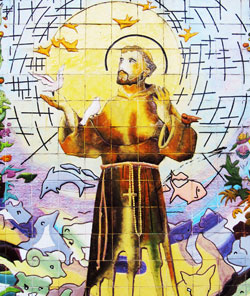Contributed by Scott Moore, Erfurt, Germany
Warm-up Question
What kind of voice do you like to listen to?
Sheep and Shepherd
Sheep are putting lawnmowers out of work. The mayor of Paris, France, Bertrand Delanoë, is working to make the city a little more “green” and ecologically friendly by using four black sheep from the South West of France. It is called “eco-grazing.” Their job is to eat the grass in front of Paris’ Municipal Archives. They are kept behind a solar-powered electric fence.
The sheep are drawing attention to the archives, which is something the director, was hoping for. Originally, the director of the archives, Agnès Masson, wanted to get a donkey or some other animal but finally accepted the four sheep. This is a project that appears to be great for the environment and an interesting attempt to raise awareness to a cultural/historical resource in a neighborhood of Paris that does not have any museums or cultural institutions.
Discussion Questions
- Would you let a sheep mow your lawn?
- What chores do you have to do that you wish an animal could do? Which animal could do it?
- What other natural ways could you get “chores” done?
- Could you imagine sheep eco-grazing the lawn around your school or your city hall or state capital?
Scripture Texts (NRSV) for Sunday, April 21, 2013 (Fourth Sunday of Easter)
(Text links are to Oremus Bible Browser. Oremus Bible Browser is not affiliated with or supported by the Evangelical Lutheran Church in America. You can find the calendar of readings for Year C at Lectionary Readings.)
For lectionary humor and insight, check the weekly comic Agnus Day.
Gospel Reflection
 This Sunday in the church year is often referred to as “Good Shepherd Sunday”. The readings always have something to do with God and Jesus and followers as sheep. In this gospel text, there are a couple of elements that call out for our attention. One of them is the part of the story that has some tension in it. Jesus is put on the spot by Jewish believers at the temple. They want to know if he really is the Messiah. They pressure him to tell them. Jesus basically says, “You missed it. I’ve performed miracles, I’ve healed, I’ve taught and you still don’t get it. You’re not going to get it now no matter what I say.” They aren’t listening. They can’t hear his voice. It is then that Jesus changes the direction away from their expectations and toward God’s reality. God takes care of the sheep. God the Father and, in this case, God’s Son are in the sheep caring business together. And, this business is about not losing sheep.
This Sunday in the church year is often referred to as “Good Shepherd Sunday”. The readings always have something to do with God and Jesus and followers as sheep. In this gospel text, there are a couple of elements that call out for our attention. One of them is the part of the story that has some tension in it. Jesus is put on the spot by Jewish believers at the temple. They want to know if he really is the Messiah. They pressure him to tell them. Jesus basically says, “You missed it. I’ve performed miracles, I’ve healed, I’ve taught and you still don’t get it. You’re not going to get it now no matter what I say.” They aren’t listening. They can’t hear his voice. It is then that Jesus changes the direction away from their expectations and toward God’s reality. God takes care of the sheep. God the Father and, in this case, God’s Son are in the sheep caring business together. And, this business is about not losing sheep.
When we experience difficult times, we look to words of comfort that tell us how much God loves us. We cherish the image of God and Jesus as loving shepherds protecting us sheep. Sometimes, however, we are just like the religious leaders in this text. We place demands on God. We want God to just “speak plainly” to us. We want to know God is with us. We want to know that Jesus the Messiah is who we think he is. But, just as Jesus doesn’t let himself get put into a box and try to prove himself out of it, God cannot be put into a box. God is bigger than our wants, yet God cares for us all the same.
Sometimes we believe we hear the voice of God in some form. Sometimes we want proof. This is what it is like to live as followers of the Risen Christ. It is certainty in the midst of uncertainty. The good news is that both Father and Son are in a divine community concerned about us. We have the stories of the faith in Scripture and we have the stories of the faith in our lives today. We are encouraged to trust in what have and to work at being open to God’s presence in our lives. We are also promised eternal life as a result in participating in God.
Discussion Questions
- When have you asked for someone to speak plainly and explain something to you again?
- When have you felt like you wanted God/Jesus to prove something to you?
- When have you felt lost and wanted God to find you and bring you back into the fold?
- What kind of proofs have you expected from God/Jesus?
- When do you find it difficult to listen?
Activity Suggestion
Shepherd Whispers— This is the game “Simon Says” but with the phrase “Shepherd Whispers” instead. The leader (Shepherd) gives commands for the sheep to follow but whispered so the sheep have to strain to hear the Shepherd’s voice. But they only follow when the Shepherd says “Shepherd Whispers X”, “Shepherd Whispers Y”. If the Shepherd doesn’t say/whisper it, then the sheep shouldn’t do it. Those that miss a command are “out”…the twist is at the end, the Shepherd says, “Shepherd Whispers, all are welcome, all are mine, all God’s sheep are loved.” A variation for this game would be to do the activity with eyes closed or using a blindfold
Closing Prayer
Loving God, you held us close when we were in pain and you sought us out when we were lost. Make your presence known to us now. Speak to us plainly. Keep us in the fold of your loving embrace. We ask this in the name of our Good Shepherd, Jesus Christ. Amen




